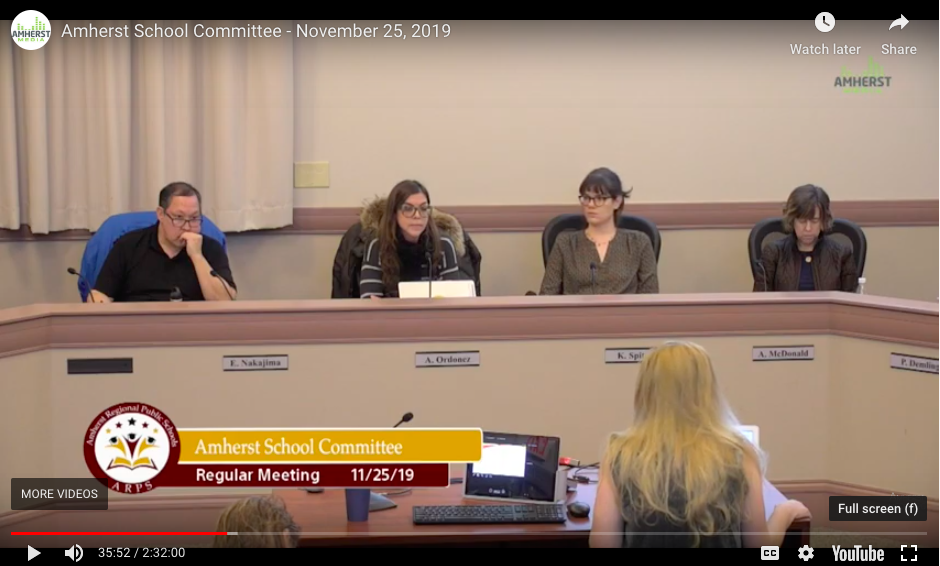QUESTIONS AND ALLEGATIONS AT PUBLIC FORUM ON AMHERST SCHOOLS

Amherst School Committee hears testimony of Amherst parent Chrissy Ryan at the Amherst Schools Public Firum on November 25. Photo: You Tube
Nearly three dozen people, including five Amherst Town Councilors, the Town Manager, and members of the press, attended the Public Forum of the Amherst School Committee, held on November 25th at Town Hall.
Five members of the public made comments, which centered on the poor performance of Crocker Farm, the impacts of moving 6th graders to the middle school, and critiques of the administration’s policies and budget priorities.
An annual public forum on Amherst’s schools is mandated by the new Home Rule Charter to “present the public with context, alert the public to upcoming issues, and collect feedback from the public.” Chair Anastasia Ordonez stated that the Committee thought that the listening sessions they held in the spring of this year met this requirement. This Public Forum was announced on the Town’s calendar one week prior to the event, replacing the first 20 minutes of a regularly-scheduled School Committee meeting. After several residents questioned the short duration and difficult timing of the forum, including it being held on the Monday before the Thanksgiving holiday, Ordonez indicated that public comment would continue as long as needed (with comments limited to 3 minutes) to ensure that everyone who wished to speak had the opportunity to do so.
Kicking off the public comment part of the forum, Amherst resident and former School Committee member Vira Douangmany-Cage requested an explanation for why students at Crocker Farm performed so poorly, as measured by state reporting. She referenced Department of Elementary and Secondary School (DESE) statistics that show Crocker Farm as being “one of the lowest performing schools in the state and needing targeted assistance and intervention.” Michael Burkhart, also of Amherst, followed up later by noting that the demographics of Crocker Farm are very similar to the Town’s two other elementary schools and wondered what could be the cause for such a discrepancy in test scores between Crocker Farm and that of Wildwood and Fort River. Both Douangmany-Cage and Burkhart wanted to know what steps were being taken to remedy the situation.
Superintendent Michael Morris replied that MCAS results are problematic. He pointed to many students opting out of testing, affecting the participation rates, and stated that MCAS results did not align with local assessments. Morris also noted that 2019 was the first year that testing was administered via computer and suggested that Crocker Farm students may not have had as much practice with this format as students at the other schools. Morris reported that a “School Improvement Plan” is in progress at Crocker Farm, which, in part, is aimed at addressing these issues.
Mary Lou Conca, a Shutesbury resident, questioned expenditures for out-of-state trips by staff when the district needs money for building repairs. Superintendent Morris responded that these expenses come out of separate budgets (i.e., operating budget for staff professional development trips, and the capital budget for building repairs).
Amherst resident Toni Cunningham requested that the District consider addressing structural deficiencies at the middle school. Cunningham stated that, while the findings of the Regional Master Facility Use Study demonstrated that 6th graders could fit in this building without requiring a major renovation, other improvements were recommended — such as the installation of a fire suppression and alarm system, provision of a secure entrance, and interior painting, all of which would cost millions of dollars. She added that when the roof is replaced, solar tubes and rooftop solar should be considered, and she asked if there is a plan for the roof repairs if it takes several more years to receive MSBA funding. Neither the Committee nor the Superintendent responded to these questions.
Cunningham also referenced an ongoing study of the possibility of moving 6th graders to the middle school, and expressed concern that this Grade Span Advisory Board is tasked with developing “teaching and team models,” but few classroom teachers on the Board (one 8th grade science teacher at ARMS and one 6th grade teacher from Pelham Elementary School), she had concerns about the Board’s ability to make progress. Cunningham also encouraged the School Committee to not be afraid to reach out to the broader community early in planning processes, be willing to address concerns that come up, and to change direction if necessary.
The forum ended with Chrissy Ryan, an Amherst resident and author of a local blog about the schools, holding the microphone for nearly 10 minutes to level multiple accusations against the School Committee and district administration. Her comments were wide ranging, among them a number of alleged misuses of budget funds, alleged exploitation of the licensure process, the use of an “unsustainable model” of spending for special education services, “disparities in discipline and educational opportunities,” and alleged Title IX violations. Ryan concluded by noting that the results of her investigations have been forwarded to the state Attorney General’s office and asserting that the Amherst School Committee has made “false allegations of bullying and harassment” against her. No Committee members, nor Superintendent Michael Morris, responded to Ryan’s allegations.
Ryan’s filibuster-like performance included having another speaker cede her three minute allotment of speaking time to her, and flatly ignoring attempts by Ordonez to end her statement. Ordonez threatened to recess the committee, at one point, when Ryan repeatedly ignored requests to stop talking. No other attendees asked to be acknowledged after Ryan finished speaking.
Aside from Ordonez introducing and managing the format, the School Committee members did not engage with members of the public during the event. The video of the forum is available here. Comments from the public start after a brief review and update of capital and pedagogical issues in the elementary schools by Morris (roughly 12 minutes into the forum). The forum ends at about the 37-minute mark, after which a regular meeting of the Amherst School Committee begins.
